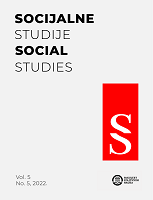FEMINIST ETHICS PERSPECTIVE ON CASES OF REFUSED ABORTION FOR IZABELA SAJBOR IN POLAND AND MIRELA ČAVAJDA IN CROATIA
FEMINIST ETHICS PERSPECTIVE ON CASES OF REFUSED ABORTION FOR IZABELA SAJBOR IN POLAND AND MIRELA ČAVAJDA IN CROATIA
Author(s): Ema-Džejna Smolo-ZukanSubject(s): Gender Studies, Ethics / Practical Philosophy, Social Philosophy, Gender history, Political behavior, Politics and law, Politics and society, Social Theory, Sociology of Politics
Published by: Fakultet političkih nauka - Univerzitet u Sarajevu
Keywords: feminist ethics; contractarianism; ethics; abortion; abortion ban; Poland; Croatia;
Summary/Abstract: The article compares two cases of refused abortion, that of Izabela Šajdor from Poland and that of Mirela Čavajda from Croatia, from a feminist ethics perspective. Based on the theory of feminist ethics and the writings of feminist theoreticians like Simone de Beauvoir, Evelyn Reed, and Susan Sherwin, as well as media reporting on the two cases, the author argues that structural oppression causes complete neglect for the perspective of women in applied ethics for these two cases of abortion, and that can be based neither in false myths of biologically inherited differences between men or women, nor the ethics of pro-life arguments, as it neglects the life of the mother. The two extreme cases reflect circumstances in which the society, and at least in Poland legally supported by governing bodies, impose an abortion ban. The consequence of such a ban is that abortion is not treated as a medical procedure but as a means of oppressing women, as evident from the treatment of Izabela Šajdor and Mirela Čavajda. The article opens the question of the ethical treatment of women in cases of abortion bans. Debates on the ethics of abortion commonly focus on the life of the fetus itself and not that of the mother. Women, in this context, become objects of broader debate and collective decision-making of society and its dominant values. As an outcome, women lose access to healthcare and bodily autonomy. A feminist ethics and feminist contractarian perspective is necessary to argue in favor of practices and approaches that bridge the gap in circumstances where women’s safety and individual decision-making is dependent on popular values.
Journal: Socijalne studije
- Issue Year: V/2022
- Issue No: 5
- Page Range: 91-111
- Page Count: 21
- Language: English

